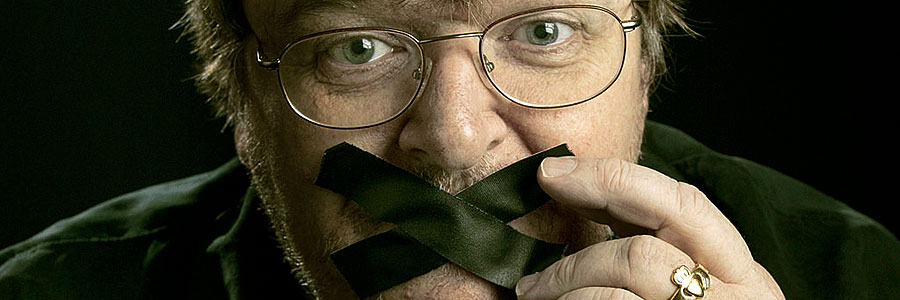
Michael Moore
‘I want to see change in my lifetime’¹ Michael Moore.
Does filmmaker Michael Moore want to change America for the good of working people or is he more interested in changing his bank balance? Do Moore’s noble intentions justify his often dubious techniques? An analysis of Moore’s documentaries reveals he always has a clear purpose and aims to have a huge impact… even if he must resort to using some creative techniques in his ‘non-fiction’ films.
With five major releases since 1989, Moore has persuaded more people to go to the cinema to see documentary films than any other filmmaker. He has always been a controversial figure, from his early career in print journalism to his most recent feature film. Muck raking enemy of the corporate and political elite, Moore has made his media all about changing America into a fairer place to live. His career has included being editor of Mother Jones magazine, creator and star of two television programmes, TV Nation and The Awful Truth, and directing music videos for bands R.E.M. and Rage Against The Machine. The shoot for R.A.T.M.’s Sleep Now In The Fire famously ended with Moore being detained by police and the New York Stock Exchange having to close its doors for the day.
Many have criticised Moore for his creative editing, his use of music, his star persona and his distortion of timelines and facts in his films. However many others champion his fight against the Bush regime, the Fox Network and other corporations and their endless brainwashing of the public.
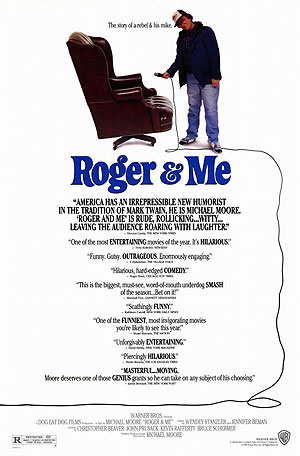 Roger & Me, 1989, dir. Michael Moore
Roger & Me, 1989, dir. Michael MooreRoger & Me (1989)
The purpose of Roger and Me is to show viewers the economic devastation that was caused to the city of Flint, Michigan when General Motors (GM) closed their factories in the city in order to cut costs. Much of Flint’s population relied on their jobs in the GM factory and the unemployment that was a result of the closure lead to a serious economic decline for the city.
Moore explores this in the film by attempting to secure an interview with then CEO of GM Roger Smith. Jim Musselman who worked on the audio on Roger and Me said
Despite interviewing Roger Smith on three separate occasions, the film does not show this. Moore instead creates a picture of himself as ‘the little guy’ who could not reach the Goliath of GM. He tells the story of the people of Flint whose lives have been affected by losing their jobs at GM. In the final scene he intercuts a family being evicted from their home on the day before Christmas Eve with a speech from Roger Smith about how wonderful Christmas is and Christmas carols can be heard on the soundtrack.
The impact of this film is hard to gauge in social and political terms but it certainly changed Moore’s career. He went on to work on two television programmes before returning to feature length documentary films.
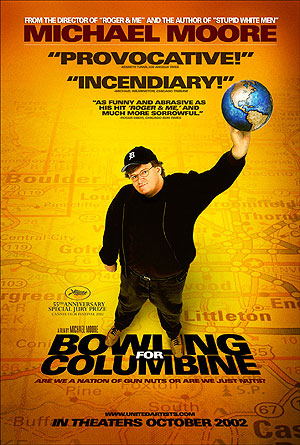 Bowling for Columbine, 2002, dir. Michael Moore
Bowling for Columbine, 2002, dir. Michael MooreBowling for Columbine (2002)
The purpose of Moore’s next major film release is to investigate America’s gun culture and explore the reasons for the Columbine High School shootings. Moore attempts to change attitudes to gun control and considers many different reasons for the gun crime rate in America including gun ownership figures, media fear-mongering and the history of racism in America.
Moore uses many interesting techniques in the film. He specifically targets Charlton Heston, a prominent figure in the National Rifle Association (NRA) for being insensitive to the victims of gun crimes. This culminates in an interview with Heston that has been criticised for bullying a fragile old man and former civil rights activist into appearing as racist. Also Moore’s use of Heston’s speeches has been criticised. Hardy and Clarke argue that Moore
Their analysis of Moore’s tricks in their book Michael Moore Is A Big Fat Stupid White Man is quite unsettling, even to a Moore fan. However Moore raises many interesting issues in the film, interviewing shock-rocker Marilyn Manson and questioning the media’s blaming of rock star’s for the way students that shoot up their schools behave. He draws links between America’s bombing of Kosovo (and mass murder of civilians throughout recent history) with the shootings in the schools and explores white American’s fears of African Americans due to the abolition of slavery and media spotlight on their crimes.
The impact the film had was not huge. There were no changes to America’s gun laws but one of Moore’s stunts did have an immediate impact. After taking two Columbine survivors to return the bullets lodged in their bodies to K-Mart, the chain agreed to stop selling guns and ammo. The film also won an Oscar and led to a controversial acceptance speech from Moore that drew cheers and boos from the Hollywood elite.
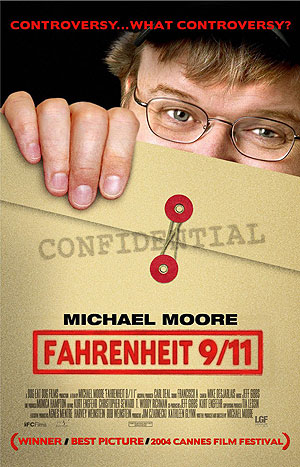 Fahrenheit 9/11, 2004, dir. Michael Moore
Fahrenheit 9/11, 2004, dir. Michael MooreFahrenheit 9/11 (2004)
Moore then went on to make the highest grossing documentary of all time, making $119,114,517 at the box office. Hardy and Clarke (2004, p.219) call it
The purpose is ambitious; to change American’s voting habits and stop them voting for another four years of George Bush Jr. as President.
Beginning by arguing that Bush rigged the previous election and therefore was not actually democratically elected, Moore then claims that Bush failed to stop the terrorist attacks of 9/11 which he already knew were imminent. The documentary ridicules Bush for the amount of holidays he takes with a montage of Bush having fun, playing golf and walking on his ranch. It criticises his response to the attacks (seven minutes of sitting in a class room, fishing, blaming Saddam Hussein) and investigates the companies and their links with the political elite that stand to make millions in profit from going to war.
His theme of media fear mongering is continued from Bowling… into this film and from the outset he suggests that the Fox network is Bush’s mouth piece, spreading lies, fear and propaganda.
Moore won the Palme D’Or at the Cannes Film Festival for the documentary but failed to stop the American people from voting in Bush for a second term as President. However it could be argued that Moore’s film sewed seeds of doubt in the American public… doubt over the morality of the wars in Iraq and Afghanistan… and doubt in leadership of the Republican Party. These doubts may have influenced the election of Democrat Barack Obama in 2008.
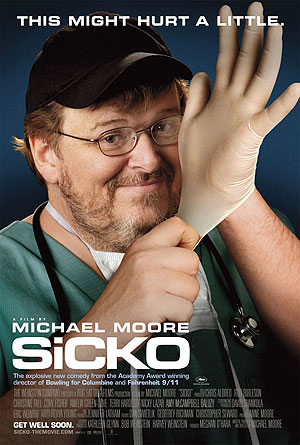 Sicko, 2007, dir. Michael Moore
Sicko, 2007, dir. Michael MooreSicko (2007)
The purpose of Moore’s next film is to change the healthcare system in America. Taking a less confrontational approach than in his previous films, Moore is not the centre of attention in this film. There are still some typical Moore stunts, particularly the scenes in which Moore takes 9/11 rescue workers to Guantanamo Bay to highlight the fact that prisoners are getting better healthcare than American heroes. Moore then takes his heroes to Cuba to show how much better other poorer countries’ healthcare systems are. He considers the systems of European countries (including our own NHS) and tells many heartbreaking stories of ordinary Americans being ‘screwed’ by their insurance companies and the pharmaceutical companies that make huge profits off their sickness. This film could be seen to have had some impact as only three years later President Obama passed a bill to reform American health care, although this is yet another issue that divides Americans and was opposed by every Republican in the Senate and a huge number of the general population.
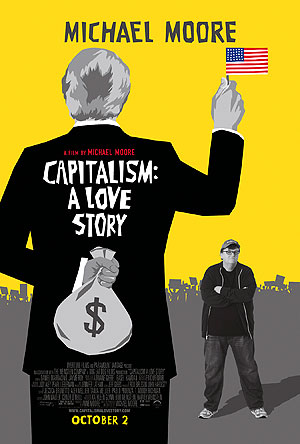 Capitalism: A Love Story, 2009, dir. Michael Moore
Capitalism: A Love Story, 2009, dir. Michael MooreCapitalism: A Love Story (2009)
Moore finally comes out of the closet and admits to being a socialist. A dirty word in America synonymous with Communism, oppression and invading body snatchers, Moore attempts to change people’s views on the capitalist economic system. He uses religion by interviewing a priest who argues that Jesus would have considered capitalism evil. He tapes up Wall Street like a crime scene and exposes the companies that have taken out ‘dead peasant’ insurance policies on their employees (if an employee dies, the company gets a massive pay out). The film is not likely to turn America into a socialist country any time soon but Moore states that his purpose was to turn America back into a democracy, ruled by people… not by money!
Former Moore employee Dan Kildee states:
In a time of subjective, bias news reporting, and ‘a time where we have a man who’s sending us to war for fictitious reasons’ (quote from Moore’s Oscar acceptance speech), Moore plays the media outlets at their own game. However the problem with being so famous and wanting to change things is, as former assistant editor of ‘Moore’s Weekly’ Andrew Morehouse says:
Moore is often criticised, particularly in Hardy and Clarke’s book, for being narcissistic and for manipulating the minds of his viewers. Moore haters will never listen to the man, arguing that he is a manipulative socialist who hates America. He may have a strong point of view and a clear purpose to change people’s minds on an issue, but Moore always has the people’s interests at heart.
This article was first published in MediaMagazine (www.mediamagazine.co.uk)
SOURCES:
Morphizm – Michael Moore Interview¹
Hardy, D. and Clarke, J. (2004) Michael Moore is a big fat stupid white man. New York; HarperCollins Publishers
Rapoport, R (2007) Citizen Moore. Muskegan; RDR Books
BBC.co.uk

Pete Turner
Peter is a film and media lecturer and currently writing his PhD thesis on found footage horror movies. This means he must endure all sorts of cinema’s worst drivel in the name of academia. If that wasn’t punishing enough, Peter enjoys watching films with brutal violence, depressing themes and a healthy splash of tragedy.
If Peter isn’t watching films, he is writing about them, talking about them or daydreaming about them. He regularly contributes to Media Magazine and a range of film websites. You can find his film blog at www.ilovethatfilm.blogspot.com and follow him on Twitter @ilovethatfilm.
© 2022 STATIC MASS EMPORIUM . All Rights Reserved. Powered by METATEMPUS | creative.timeless.personal. | DISCLAIMER, TERMS & CONDITIONS
HOME | ABOUT | CONTACT | TWITTER | GOOGLE+ | FACEBOOK | TUMBLR | YOUTUBE | RSS FEED
CINEMA REVIEWS | BLU-RAY & DVD | THE EMPORIUM | DOCUMENTARIES | WORLD CINEMA | CULT MOVIES | INDIAN CINEMA | EARLY CINEMA
MOVIE CLASSICS | DECONSTRUCTING CINEMA | SOUNDTRACKS | INTERVIEWS | THE DIRECTOR’S CHAIR | JAPANESE CINEMA





